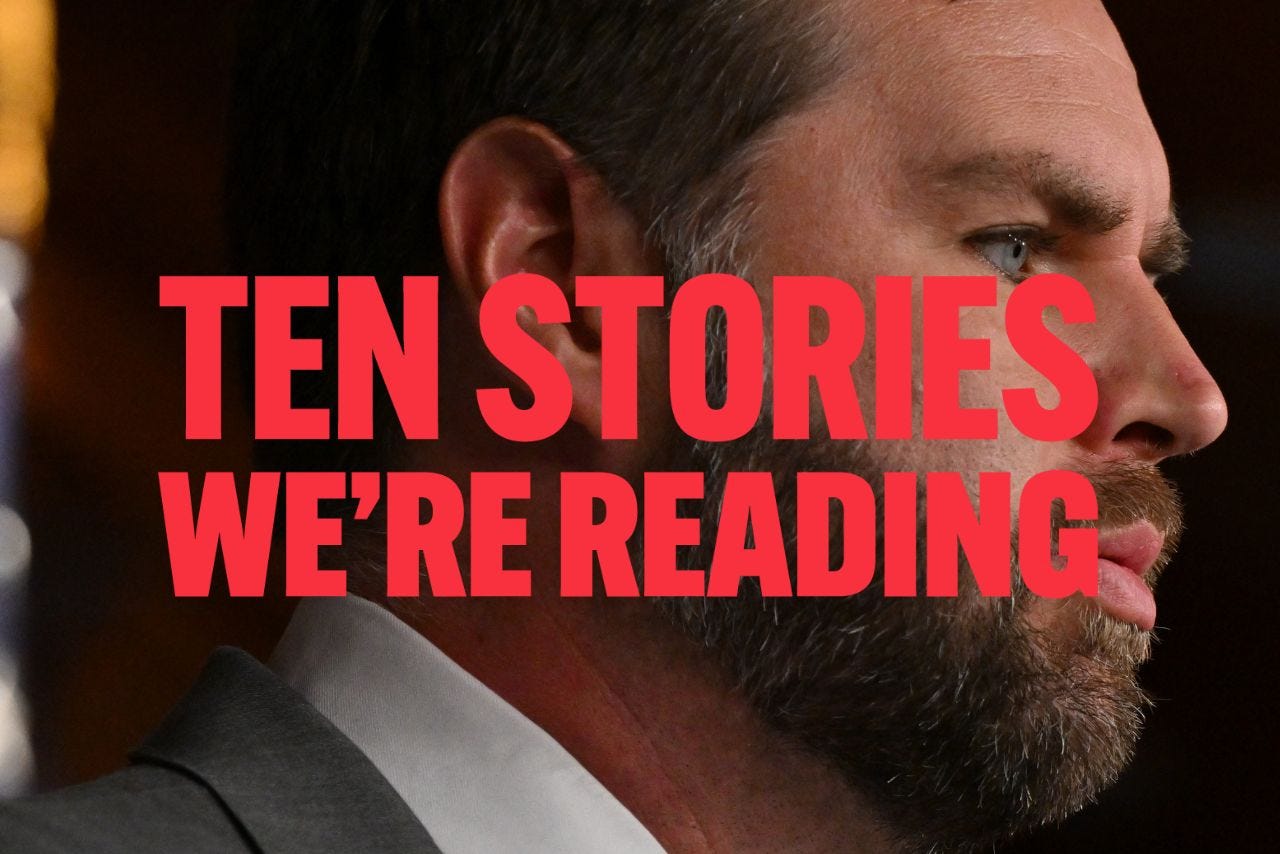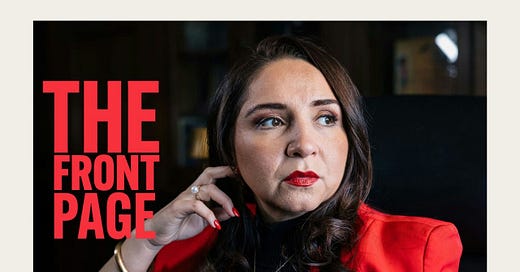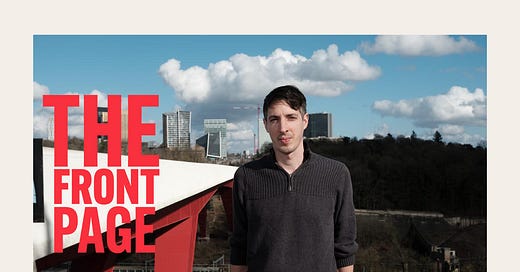
The Free Press

Is Alec Baldwin on trial more Amber Heard than Gwyneth Paltrow? Should we take a top spy’s word on Iran’s influence operation? Does Trump have a problem with J.D. Vance’s beard? All this and more in today’s Front Page from The Free Press.
But first, for our lead story: Leighton Woodhouse reports on how Oakland became a failed city. Here’s Leighton:
I’ve lived in Oakland for about six years. From my house, I can hear the sounds of screeching tires from “sideshows”—a city tradition where drivers take over intersections and perform donuts in front of cheering crowds—multiple times a day. Burned-out husks of stolen and abandoned cars appear like roadkill by curbsides. It’s hard to tell whether staccato claps in the distance are illegal fireworks or gunshots.
The past several months alone have been so chaotic that community organizer Seneca Scott, who has lived here for 12 years and is also a Free Press contributor, declared on X on July 7 that “Oakland has fallen.”
Oakland has a long history of crime, but residents say there’s something sinister about this current wave.
“There’s this sense of lawlessness,” LeRonne Armstrong, the city’s former police chief who was fired last year by the mayor and is now running for city council, told me. “This sense of, we can do whatever, there really aren’t any consequences—almost like a video game, like Grand Theft Auto or something.”
On top of it all, on July 9, the city council voted to allow a recall referendum for Mayor Sheng Thao on the November ballot. DA Pamela Price also faces a recall, and both could be ousted before the end of this year. Read on to find out how Oakland descended into lawlessness, overseen by a scandal-ridden mayor.
On the letters page this week, check out the tech worker who says Niall Ferguson is too glum about the U.S. economy in his viral essay “We’re All Soviets Now.” Read multiple subscribers’ moving reflections on Ben Kawaller’s report, “What If the Most Notorious Murder of a Gay Man Wasn’t a Hate Crime?” And find out how a reader with severe sensorineural hearing loss reacted to Eli Steele’s essay “I Was Born Deaf. I Feel Lucky.” Click to read all that and more.
As Trump’s VP announcement nears, one important question is whether J.D. Vance will be passed over because of his facial hair. “J.D. has a beard. But Trump is a clean-shaven guy. He just doesn’t like facial hair,” a Trump confidant told The Bulwark. But on Fox yesterday, Trump denied any hirsute handicap. “No. Never heard that one. He looks good,” Trump told Brian Kilmeade. “Looks like a young Abraham Lincoln.” What did we learn from the beard story? Trump needs to pick already, so we can drop all this dumb speculation. (The Bulwark)
Make a decision, Joe. That was the message for the president from senior Democrats on the Hill Wednesday, including Rep. Nancy Pelosi and Sen. Tim Kaine. The problem for Pelosi et al.: Biden seems to have made up his mind about staying in the race. The president has also lost George Clooney. (Fox News)
Why are Democrats so eager for a “decision”? Look no further than the race ratings from the respected Cook Political Report. The publication, a must-read for Washington insiders, updated ratings for six states—all in Trump’s direction. Cook moved Minnesota, New Hampshire, and Nebraska’s Second Congressional District from “Likely Democratic” to “Lean Democratic,” and switched Nevada, Georgia, and Arizona from “Toss-up” to “Lean Republican.” (The Hill)
In a further sign of Democratic fright, party organizers in New York warned yesterday that the race for the White House is getting competitive in their supposedly deep-blue state. A Republican presidential candidate hasn’t won in the Empire State since Ronald Reagan’s shellacking of Walter Mondale in 1984. (Politico)
The history of presidential medical cover-ups is bountiful. None is as egregious as the attempt to keep the American people from knowing about Woodrow Wilson’s stroke. “The president was desperate to cement his legacy and did not consider resigning,” writes Santi Ruiz in the introduction to an interview with Wilson biographer John Milton Cooper Jr. “In fact, he felt confident he could run for another term despite his acute medical condition.” Sound familiar? (Statecraft)
Harvard has reversed suspensions of anti-Israel protesters who violated campus rules. Jewish leaders say the move will lead to more antisemitism. (Jewish Insider)
In a new New York Times opinion video, Free Press contributor Rob Henderson introduces the paper’s readers to his concept of “luxury beliefs.” It’s a fascinating clip and great to see a new audience exposed to Rob’s important ideas—which he explained to listeners of Honestly back in 2021. (NYT)
A Georgia doctor is suing NBC after MSNBC’s prime time stars accused him of performing “mass hysterectomies” on women at an immigration facility during the Trump administration. A judge ruled that Rachel Maddow, Nicolle Wallace, and Chris Hayes made “verifiably false” claims about the doctor, who is suing for $30 million. Coincidentally, that is about as much as Maddow is thought to make per year for her once-weekly show. (Washington Free Beacon)
Another reason Europeans are about to fizzle at the Olympics: they apparently don’t drink water. Or at least according to Stanley Cup–toting American tourists dumbfounded by Europeans’ approach to hydration. (CNN)
Culture commentator Ted Gioia has an “extreme” approach to reading. But, he warns, “I am not recommending these tips and techniques for anybody. . . I went beyond what was reasonable—almost the way a high performance athlete trains for some ultra-competitive event.” (Honest Broker)
The trial of actor Alec Baldwin began yesterday, nearly three years after he shot and killed a woman on a movie set outside Sante Fe. The charge is involuntary manslaughter, not murder; Baldwin, who fired the reproduction revolver that killed Rust’s cinematographer Halyna Hutchins, had been told the weapon wasn’t loaded. But through some combination of negligence and incompetence, there was one real bullet in the gun’s chamber.
What happened that day, in October 2021, was a horrible tragedy, but also unambiguously an accident—and yet, Baldwin has been subjected to an unusually zealous prosecution by New Mexico authorities. It’s a case that illuminates just how complex things can get when criminal justice intersects with a person’s celebrity status.
In this world, the roles of victim and villain are determined by an inscrutable calculus: the more powerful and privileged you are, the less sympathy you get, with additional points off for being a jerk, a weirdo, or a weirdo jerk. This last one is arguably how Amber Heard snatched defeat from the jaws of victory in her case against Johnny Depp, particularly once allegations emerged that after a fight with her husband, she had intentionally defecated on their bed.
On the other hand, successfully spinning the narrative in your favor can mitigate the handicap of fame, as in Gwyneth Paltrow’s civil trial against the septuagenarian she collided with on a Park City ski slope. Paltrow’s insistence on going to court proved a genius strategy: suddenly, this was a story about a strong woman refusing to be bullied, a story in which her celebrity status made her not just sympathetic, but perhaps even a victim. The plaintiff became a gold-digger, as we all found ourselves asking: If it had been a dental hygienist from Des Moines who crashed into Terry Sanderson, would he have chased her into a courtroom in search of a payday?
Alec Baldwin, alas, is no girlboss. Actually, he’s just about the most unsympathetic collection of things you can be in 2024: an old, white, rich, and famous man protesting his innocence. Read on for why Baldwin is more of an Amber Heard than a Gwyneth Paltrow.
Before we continue, a brief message from Suzy Weiss:
Hello, Free Pressers! Do you have something eating at you? Maybe your spouse is acting weird, or you’re at a crossroads in your career, or perhaps you were canceled by your intern and now you have to flee the country and don’t know if you should go for Canada or something more tropical? I have good news.
We’re putting together an advice show for Honestly, and we’ve assembled an all-star panel—it’s Caitlin Flanagan and me—to help you get your life straight. Call this number—805-387-2530—and lay it on us: we’re here to dispense advice on parenthood, sisterhood, death, romance, work, love, war, and party hosting. Be sure to leave your name and the best way to contact you in case our producers need a little more dirt!
→ The “benefits” of being a conservative on campus: Is getting harassed by other students evidence of an effective college education? How about getting indoctrinated by professors? Or slandered on social media?
No? None of these? That would put you at odds with an Atlantic essay published Monday that attempts to frame experiences like these as examples, according to its title, of “How Liberal College Campuses Benefit Conservative Students.”
The essay was written by Lauren Wright, who teaches at Princeton. She argues that conservatives at predominantly liberal colleges get “exposure to different perspectives, regular practice building and defending coherent arguments, [and] intellectual challenges that spur creativity and growth.” Wright says these are benefits that liberal students have been “robbed” of. And she says that right-wing critics of these schools are missing something: that it is conservatives, not liberals, who reap “what higher education has long claimed to offer.”
As a right-of-center undergraduate at Columbia, I take Wright’s point. I have certainly derived some benefit from living and learning on a campus where vanishingly few students identify as conservative. I have developed “thick skin” and emerged “more resilient”—two of the benefits cited by Wright. But that doesn’t make up for facing a hostile environment on campus because of my mainstream political beliefs.
For reporting on Columbia’s anti-Israel protests and the occupation of Hamilton Hall for the Columbia Sundial and The Free Press, other students, including many in student government, slandered me on social media. Others yelled at me on the street. One particularly charming Columbian screamed “Fuck you” and gave me the finger. For the most part, I have been able to shut all this out and remain focused on my reporting. But these experiences don’t feel like an “educational advantage.”
When Columbia professors attempt to indoctrinate and radicalize students in support of Palestinian extremism, it’s inevitable that pro-Israel students will feel “challenged” in class discussions and develop valuable argumentation skills. That does not mean we should applaud these professors for their intellectual beneficence.
Wright argues that it’d be a mistake for conservatives to abandon elite colleges. I agree. But the intolerance conservative students like me are forced to endure is nothing to celebrate. —Jonas Du
→ Trust us, we’re the intelligence community: On Tuesday, Avril Haines, the director of national intelligence, dropped a bombshell. In a public statement, she said, “In recent weeks, Iranian government actors have sought to opportunistically take advantage of ongoing protests regarding the war in Gaza.” She added, “We have observed actors tied to Iran’s government posing as activists online, seeking to encourage protests, and even providing financial support to protesters.”
Pro-Gaza protesters being manipulated by Iran’s government? That should be a five-alarm newsgasm. The problem is that Haines has not provided any evidence to support this extraordinary claim.
In some ways, this is understandable. Intelligence agencies are miserly when it comes to sharing how they know what they know. And if the year were 2016, the spies may have gotten the benefit of the doubt. But it’s 2024 and most Americans still remember the trauma of Russiagate, when a parade of pundits, journalists, and former government officials argued that a handful of Russian online fake personas, WikiLeaks’ hacked Hillary Clinton emails, and Facebook ads swung the 2016 election to Donald Trump. Throughout the panic, unquestioning acceptance of claims from the “intelligence community” fanned the flames.
The problem with the story was not that Russia hadn’t tried to interfere with the 2016 election. It did. Rather, it was the implicit assumption that American voters were so ill-informed and gullible that many of them were swayed to vote for Trump because of Moscow’s online fakery.
And this leads back to Iran’s efforts to attempt to influence American politics. In some ways this is nothing new. In 2018, the cyber intelligence firm FireEye Intelligence released a report documenting Iranian fake news sites and their efforts to sway U.S. public opinion. It found that the efforts were amateurish. For example, a number of fake personas were registered with phone numbers that included Iran’s country code. The propaganda itself was crude, such as messages celebrating Quds Day, a holiday invented by Iran’s regime to single out the Palestinian struggle to conquer Jerusalem.
Haines may be giving the Iranians too much credit. While she acknowledges “Americans who participate in protests are, in good faith, expressing their views on the conflict in Gaza,” she also warns “Americans who are being targeted by this Iranian campaign may not be aware that they are interacting with or receiving support from a foreign government.”
The implication is that American supporters of Hamas are the unwitting victims of foreign propaganda. That glosses over a much deeper problem, though. Many of the Americans who block traffic and take over quads on behalf of the terrorists of October 7 are not taking their cues from Persian cyber-spies, but college professors and journalists. For generations these information elites have insisted that Palestinian terror is a legitimate expression of Palestinian dispossession. But the root cause is not foreign disinformation so much as domestic ideology. —Eli Lake
Single readers: The Free Press Cupid is back, and he’s ready to find your summer love. Here are two more Free Pressers looking for their match. If you think that’s you, drop them a line—and to submit your own entry, email cupid@thefp.com.
Jacalyn Webster, 27, San Diego, CA
I’m a 27-year-old vegan yogi who lives in Southern California, looking for a curious and compassionate woman or man to share fiery takes, açai bowls, and eventually a future. My dreams range from being a homesteading housewife living off the grid to a bustling life in Tokyo.
I grew up in northern Michigan and have lived in many places over the past decade. My job is remote, and while I’m enjoying sunny San Diego, I’m not set on staying here permanently. Some of my favorite things include leaving my phone at home for the day, seeing live music, dance, theater, wine bars, and planning detailed travel itineraries. I’m always open to having my mind changed. I’m a blue-eyed, long-haired brunette, and as far as makeup, I only wear SPF moisturizer and lipstick.
Discovering The Free Press surprised me. Here’s to hoping a fellow reader out there will be surprised too!
Christine Malluise, 45, Seattle and the Bay Area
I’m a culinary school dropout who now runs my own recruiting firm. I’m also training to not drown in an upcoming mini triathlon, and I have dreams of being a swanny Pilates teacher. I’m kind but with a mean shoe game, and I love making people laugh. I’m looking for a funny, tall, brilliant man, who is also kind.
If interested, email me at cmalluise@gmail.com.
Oliver Wiseman is a writer and editor for The Free Press. Follow him on X @ollywiseman.
To support The Free Press, become a paid subscriber today:
And if you’re enjoying The Front Page, consider forwarding it to someone else you think might like it.





















CASE DISMISSED.
"Baldwin has been subjected to an unusually zealous prosecution by New Mexico authorities." Yeah, no. Any mentally competent person not planning to kill someone has an obligation to make sure that a gun is not loaded before pointing it at someone and pulling the trigger. Duh, like, it was someone else's job isn't an excuse.
Should the armorer have made sure that the weapon was unloaded and that no one except her had access to the weapons? Absolutely. However, that does not excuse Baldwin for failing to verify the weapons status for himself. Trust, but verify, is the number one rule of gun safety, even on a movie set.
Involuntary manslaughter means that he did something that a reasonable person could reasonably foresee could result in the death of another. Pointing a gun that you have not personally verified to be unloaded directly at someone and pulling the trigger is something that a reasonable person, even a dumb-ass, entitled actor, could reasonably foresee could potentially be dangerous. Baldwin was negligent, lazy, or just plain stupid. As a result, someone lost their life.